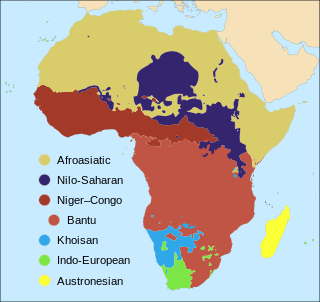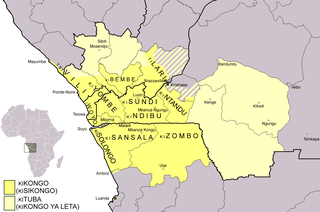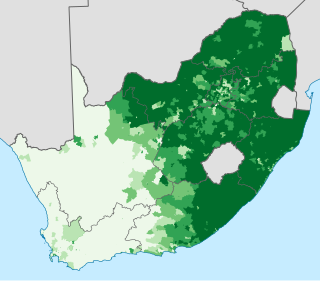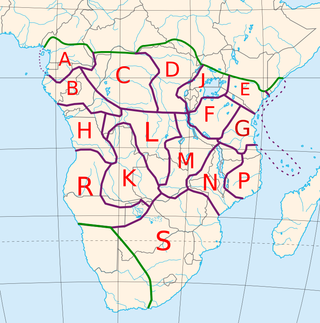This list needs additional citations for verification .(July 2012) |
This is a list of English language words that come from the Niger-Congo languages. It excludes placenames except where they have become common words.
This list needs additional citations for verification .(July 2012) |
This is a list of English language words that come from the Niger-Congo languages. It excludes placenames except where they have become common words.

The Bantu languages are a language family of about 600 languages that are spoken by the Bantu peoples of Central, Southern, Eastern and Southeast Africa. They form the largest branch of the Southern Bantoid languages.

The number of languages natively spoken in Africa is variously estimated at between 1,250 and 2,100, and by some counts at over 3,000. Nigeria alone has over 500 languages, one of the greatest concentrations of linguistic diversity in the world. The languages of Africa belong to many distinct language families, among which the largest are:

The West Atlantic languages of West Africa are a major subgroup of the Niger–Congo languages.
SothoSesotho, also known as Southern Sotho or Sesotho sa Borwa is a Southern Bantu language of the Sotho–Tswana ("S.30") group, spoken in Lesotho, and South Africa where it is an official language.
The Nguni languages are a group of Bantu languages spoken in southern Africa by the Nguni people. Nguni languages include Xhosa, Hlubi, Zulu, Ndebele, and Swati. The appellation "Nguni" derives from the Nguni cattle type. Ngoni is an older, or a shifted, variant.

Candomblé Bantu is one of the major branches (nations) of the Candomblé religious belief system. It developed in the Portuguese Empire among Kongo and Mbundu slaves who spoke Kikongo and Kimbundu languages. The supreme and creative god is Nzambi or Nzambi a Mpungu. Below him are the Jinkisi or Minkisi, deities of Bantu mythology. These deities resemble Olorun and the other orishas of the Yoruba religion. Minkisi is a Kongo language term: it is the plural of Nkisi, meaning "receptacle". Akixi comes from the Kimbundu language term Mukixi.

Kongo or Kikongo is one of the Bantu languages spoken by the Kongo people living in the Democratic Republic of the Congo (DRC), the Republic of the Congo, Gabon, and Angola. It is a tonal language. The vast majority of present-day speakers live in Africa. There are roughly seven million native speakers of Kongo in the above-named countries. An estimated five million more speakers use it as a second language.

The Gullah are a subgroup of the African American ethnic group, who predominantly live in the Lowcountry region of the U.S. states of South Carolina, North Carolina, Georgia, and Florida within the coastal plain and the Sea Islands. Their language and culture have preserved a significant influence of Africanisms as a result of their historical geographic isolation and the community's relation to their shared history and identity.
Fanagalo, or Fanakalo, is a vernacular or pidgin based primarily on Zulu with input from English and a small amount of Afrikaans input. It is used as a lingua franca, mainly in the gold, diamond, coal and copper mining industries in South Africa and to a lesser extent in the Democratic Republic of the Congo, Namibia, Zambia, and Zimbabwe. Although it is used as a second language only, the number of speakers was estimated as "several hundred thousand" in 1975. By the time independence came–or in the case of South Africa, universal suffrage–English had become sufficiently widely spoken and understood that it became the lingua franca, enabling different ethnic groups in the same country to communicate with each other, and Fanagalo use declined.
Tsotsitaal is a South African vernacular dialect derived from a variety of mixed languages mainly spoken in the townships of Gauteng province, but also in other agglomerations all over South Africa. Tsotsi is a Sesotho, Pedi or Tswana slang word for a "thug" or "robber" or "criminal", possibly from the verb "ho lotsa" "to sharpen", whose meaning has been modified in modern times to include "to con"; or from the tsetse fly, as the language was first known as Flytaal, although flaai also means "cool" or "street smart". The word taal in Afrikaans means "language".

South African Bantu-speaking peoples represent the majority indigenous ethno-racial group of South Africans. Occasionally grouped as Bantu, the term itself is derived from the English word "people", common to many of the Bantu languages. The Oxford Dictionary of South African English describes "Bantu", when used in a contemporary usage or racial context as "obsolescent and offensive", because of its strong association with the "white minority rule" with their Apartheid system. However, Bantu is used without pejorative connotations in other parts of Africa and is still used in South Africa as the group term for the language family.
The phonology of Sesotho and those of the other Sotho–Tswana languages are radically different from those of "older" or more "stereotypical" Bantu languages. Modern Sesotho in particular has very mixed origins inheriting many words and idioms from non-Sotho–Tswana languages.
The Southern Bantu languages are a large group of Bantu languages, largely validated in Janson (1991/92). They are nearly synonymous with Guthrie's Bantu zone S, apart from the debated exclusion of Shona and inclusion of Makhuwa. They include all of the major Bantu languages of South Africa, Botswana, Lesotho, Eswatini, and Mozambique, with outliers such as Lozi in Zambia and Namibia, and Ngoni in Zambia, Tanzania and Malawi.
Sierra Leonean Americans are an ethnic group of Americans of full or partial Sierra Leonean ancestry. This includes Sierra Leone Creoles whose ancestors were African American Black Loyalists freed after fighting on the side of the British during the American Revolutionary War. Some African Americans trace their roots to indigenous enslaved Sierra Leoneans exported to the United States between the 18th and early 19th century. In particular, the Gullah people of partial Sierra Leonean ancestry, fled their owners and settled in parts of South Carolina, Georgia, and the Sea Islands, where they still retain their cultural heritage. The first wave of Sierra Leoneans to the United States, after the slavery period, was after the Sierra Leone Civil War in the 1990s and early 2000s. According to the American Community Survey, there are 34,161 Sierra Leonean immigrants living in the United States.
Buckra or Backra is a term of West African origin. It is mainly used in the Caribbean and the Southeast United States. Originally, it was used by slaves to address their white owners. Later, the meaning was broadened to generally describe white people.
EfikEF-ik is the indigenous language of the Efik people, who are situated in the present-day Cross River State and Akwa Ibom State of Nigeria, as well as in the north-west of Cameroon. The Efik language is mutually intelligible with other lower Cross River languages such as Ibibio, Anaang, Oro and Ekid but the degree of intelligibility in the case of Oro and Ekid is unidirectional; in other words, speakers of these languages speak and understand Efik but not vice versa. The Efik vocabulary has been enriched and influenced by external contact with the British, Portuguese and other surrounding communities such as Balondo, Oron, Efut, Okoyong, Efiat and Ekoi (Qua).

The Bantu peoples are an indigenous ethnolinguistic grouping of approximately 400 distinct native African ethnic groups who speak Bantu languages. The languages are native to countries spread over a vast area from West Africa, to Central Africa, Southeast Africa and into Southern Africa. Bantu people also inhabit southern areas of Northeast African states.

Petit nègre, also known as Français tirailleur or Petinègue or Forofifon naspa, is a pidgin language that was spoken by West African soldiers and their white officers in the French colonial army and across certain French colonies approximately from 1857 to 1954. It consists of a simplified form of French. It never creolized, and the "simplified" language was taught to indigenous inhabitants in the French colonial army in the French colonies.
The following list names English words that originate from African languages.
This article includes a list of general references, but it lacks sufficient corresponding inline citations .(July 2012) |
Notes
Sources